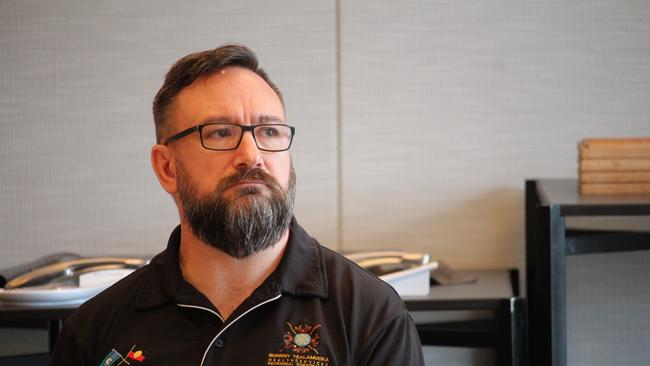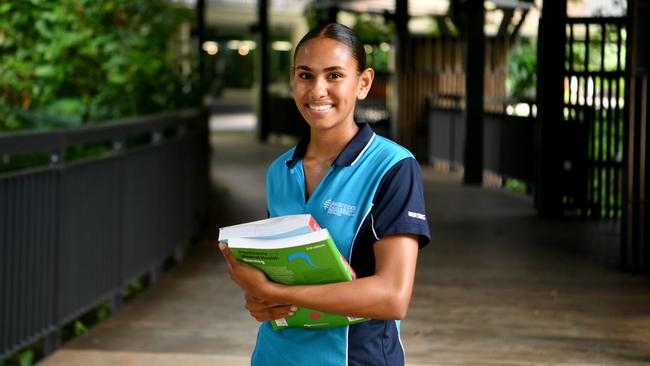Indigenous Queenslanders reluctant to attend state-run hospitals
Indigenous Queenslanders are calling for more fair and culturally appropriate treatment in hospitals, as many are refusing to seek treatment in hospitals following fear of discrimination.
QLD Politics
Don't miss out on the headlines from QLD Politics. Followed categories will be added to My News.
Indigenous Queenslanders are calling for fairer and more culturally appropriate treatment in hospitals, with health workers warning little headway has been made when it comes to First Nations people facing discrimination.
Gurriny Yealamucka Health Service Aboriginal Corporation director of clinical services Jason King said it was an issue that Indigenous medical practices had seen over many generations.
“There is a fearfulness towards large hospital institutions, and this goes back many years,” he said.
“And if you look at the history of Queensland, and across Australia, we see the history of how Aboriginal Torres Strait Islander people have been treated in large institutions, such as hospitals, and the kinds of racism that they encounter, still to this day.
“And while Queensland Health has undertaken health equity reform agenda in the last five or six years, certainly we need to be aware that those institutional racist elements are still at play.”

In 2017, the anti-discrimination commission published an audit, revealing a high level of institutional racism in Queensland hospitals, notably across Cairns and Hinterland Hospital and Health Service in Far North Queensland.
Among the Indigenous Queenslanders refusing to seek medical treatment in hospitals are a number of pregnant women unwilling to give birth in hospitals.
“We do know that women that are pregnant sometimes try and avoid going to hospital because they’re fearful of many things,” Dr King said.
“Sometimes it’s that transgenerational trauma associated with the Stolen Generation of children being taken away, and we do know that today we still have high rates of children being removed for a variety of reasons, and sometimes those reasons aren’t supported very well.”
One of these concerns for pregnant First Nations women includes having their newborns be removed by child services while in hospital.
Queensland Health’s Chief First Nations Health Officer and Deputy Director General Haylene Grogan said the department was committed to providing improved care for Indigenous Queenslanders statewide.
“Queensland Health has worked with, and listened to, First Nations peoples.
“What we’re hearing loud and clear is that they want a better, just and equitable future where everyone has the potential to live long and healthy lives,
“Guided by their leadership, we are redesigning and reshaping our local healthcare systems based on what First Nation peoples want and need to reach their full health potential.
Ms Grogan added that government have began implementing a number of changes to ensure that First Nations people feel comfortable using the state health care system.
“Our large city hospitals are often intimidating as well as challenging to access easily for patients from rural and remote communities, so it is also important to connect those patients with staff who share and understand what they’re going through,” she said.
“As of January 2023, 2,737 Queensland Health employees identify as Aboriginal and Torres Strait Islander, and we are currently working on initiatives to increase this number.
“Having more Aboriginal and Torres Strait Islander people working on our wards (and across the whole system from gardeners to surgeons) will help us improve health outcomes for our First Nations people in Queensland.

“As a result, our Aboriginal and Torres Strait Islander patients will receive more culturally appropriate care, which means they’re less likely to discharge against medical advice.”
Royal Flying Doctor Service’s State Lead Primary Health Care, Dr Michelle Hannan said there was a need for quality health services within these Indigenous communities.
“It’s certainly something that people feel very strongly about that they would like to stay on country as much as possible, and we’re very much supportive of delivering care as close to home as we possibly can,” she said.
“I think it’s all about having services are available to people locally that are that are culturally appropriate for them and that they’re able to put their trust in and that they’ll go and see regularly.”
RFDS’ Best for the Bush Report 2022 report found that Indigenous people in remote and very remote Australia, have a life expectancy 14 years shorter compared to non-Indigenous people in these areas.
“In terms of health equity for Indigenous people, we’re still seeing children with acute rheumatic fever, and people then going on to develop rheumatic heart disease,” Dr Hannan said.
“And we know that diabetes is a big issue in some of the remote communities as well, and that leads particularly, in Aboriginal people, into issues with their kidneys, and we end up with a lot of people requiring dialysis because of kidney disease.”
First year Nursing and Midwifery student, and Torres Strait Islander, Nina Lui said her desire to provide culturally-specific healthcare to her community is what drove her to study nursing at JCU Townsville.
“I know for some First Nations people, it’s hard to come forward to seek the help they need when there’s not really much Indigenous support around for them.”
“Indigenous people know how to care for other First Nations people, they’re treating them like they’re their family, so it’s just like a different sort of care they give to Indigenous people,
“So I’ve always wanted to be someone there that could support First Nations people whenever they’re getting the help they need.”





